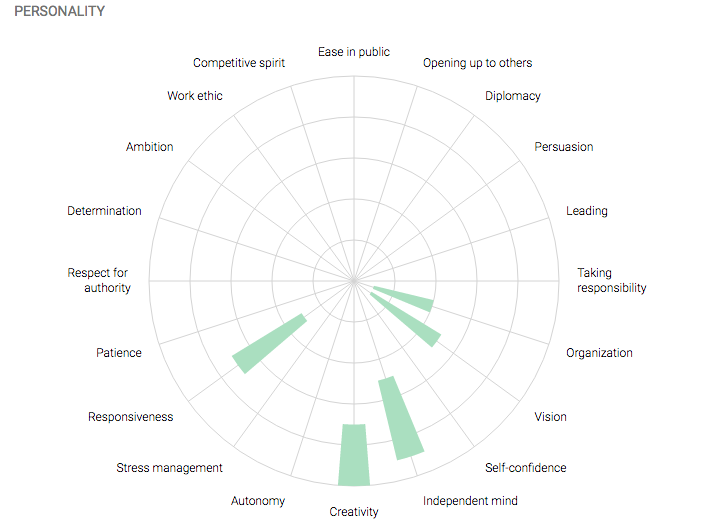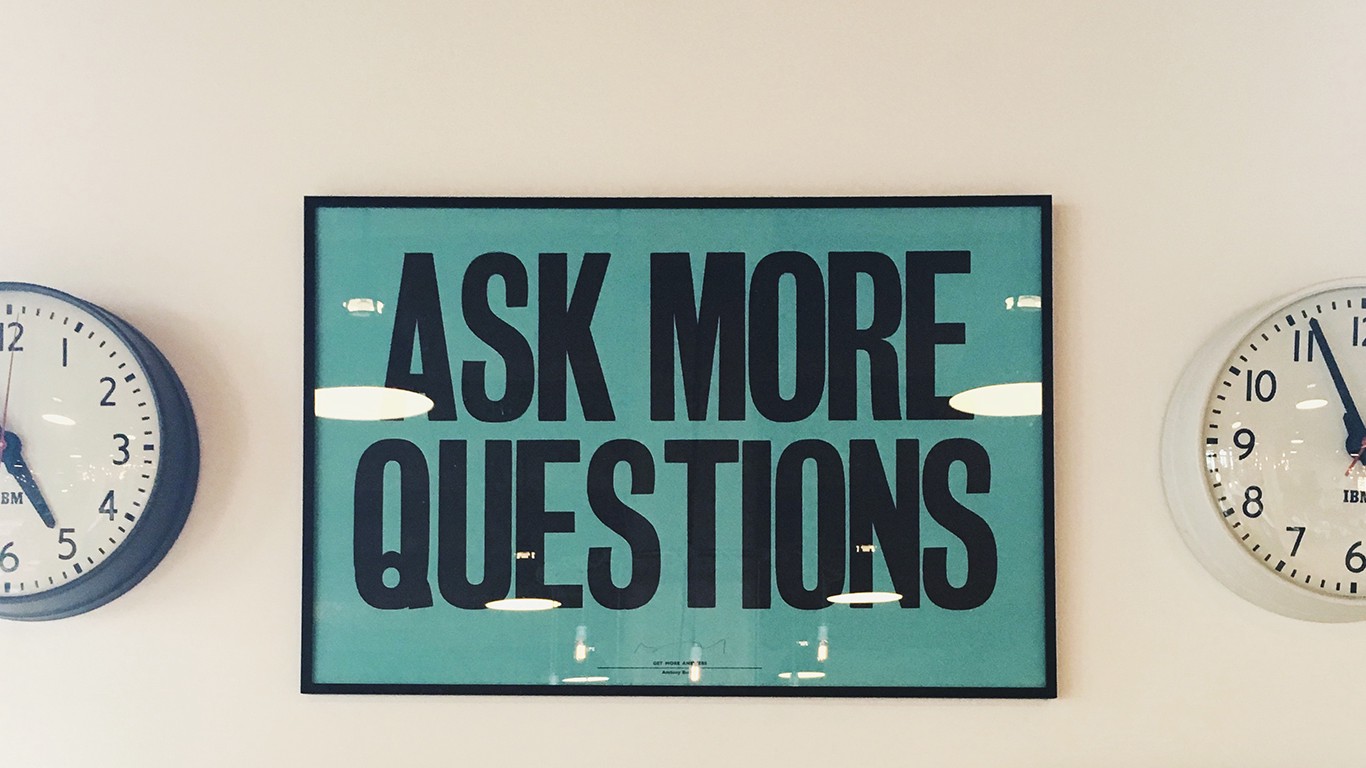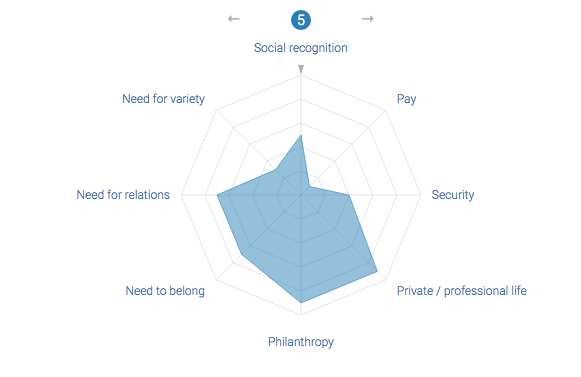How to hire a super star sales professional.

3 unique traits in those who close deals
A great product or service can easily go unnoticed if it does not have the right people to sell it. As a hiring manager, how can you find sales stars that shine? With thousands of sales professionals in our data base, we have created a profile on what makes an individual a great deal closer — & it is not what you may think. According to our data, top sales performers display the following traits:

#1 Creative: Lives (and thinks) outside the box
There are many ways to sell a product or service, and the same approach is not right for everyone. Creativity is often required to take a customer from “maybe” to “yes” and close a deal.
A successful salesperson thrives in an environment where they need to constantly adapt to changing goals and creatively solve problems on a daily basis. You don’t want someone who sometimes thinks outside the box, you want someone who doesn’t know that the box even exists.
#2 Responsive: Intuition based decision making
Have you ever felt like the car salesman down the street read your mind? Well, they did. Salesmen/women rely so heavily on their intuition that they can easily get in their customers head and are usually two steps ahead. Genuine sales professionals are quick on their feet, and favor spontaneous action over reflection.
But while they are quick they are also swift and can adapt to a new situation at the drop of a hat. Their chameleon like nature allows them to respond to the personalities of a rainbow of potential customers.
Team members who have mastered the art of clear and consistent communication with their clients will lead your company to higher customer satisfaction, and a better bottom line as a result.
#3 Independent mind: Supervision not required
A rockstar salesperson should be able to take a goal and run with it. That means setting their own schedule and ensuring that all relevant goals are met on time.
Self motivation is crucial, especially in environments where sales reps work remotely or travel frequently. Managers should be able to support their teams without getting in the weeds on day-to-day details.
The total superstar sales package
The key to making a sale is understanding customers’ needs and figuring out how your product or service can meet them — the intersection of creativity, responsiveness, and independence. Find someone who has all three and you are well on your way to success.
While every employee is unique, these insights may help you determine which applications rise to the top of the pile. For help hiring your next sales professional use this job matching system to see how your candidates stack up against your current sales team. Stop relying on your gut instinct for hiring (leave that to sales) and start making data-driven decisions.
Want to read more recruiting tips and tricks? Check out my blog page.
The future of recruiting: how to save time, money & stress.

How to Save Time and Money in the Hiring Process.
On paper, the candidate seemed great. But as you stare across the conference table at his disinterested, glazed expression, you wish you had a Doctor Evil button to press so you could watch his chair get swallowed by the floor. You’re a professional, though, so you finish your interview and politely escort him out after a wasted hour. What went wrong? He seemed amazing from his resume!
The average recruiter spends nearly 40 hours and over $1,000 to hire someone (1). And hiring the wrong person can cost a company more than $50,000 in lost productivity(2)! Companies don’t just have to handle replacement and re-training costs of the employee that didn’t work out, but a mismatched employee will affect the entire team’s morale as they scramble to get that person’s work done. In 2012, 22% of recruiters reported that the reason for their bad hires was because of “insufficient talent intelligence.” Issues and personality traits came out after hiring that the recruiter didn’t expect. Recruiters in today’s fast paced quota-filling atmosphere have a limited amount of time to get to know candidates extremely well. Efficiency is critical.
So how can recruiters speed up the process and hire the right talent the first time? Using psychology-based testing prior to interviews can give recruiters important insight into a candidate’s personality. Most of us at one time or another have taken the old-school, popular “Myers-Briggs” test and gotten the four-letter acronym that “matches” us (a.k.a. tries to fit us into convenient little boxes) — any other ENFJ’s out there? But that test was researched and developed in the 1940’s!
Today, recruiters need to understand what drives today’s workforce, and more importantly what motivates them at work. Instead of being placed in a generic box, recruiters should be able to match candidate’s traits and motivators with the team and the company’s unique culture to see if they will make a good fit.
Using a modern psychology-based tool like Talentobe Manager, that was developed with the traits of today’s workforce and the uniqueness of your company in mind, means you have personalized insights by professional psychologists! Really knowing who your candidate is, what motivates him or her, and how he or she will fit on a team, in a role and at your company — before they even come in to interview — will save countless hours and dollars interviewing, negotiating, and potentially re-hiring
And you won’t need your Doctor Evil button after all.
Want to read more recruiting tips and tricks? Check out my blog page.
Sources:
- GetHired.com as reported on http://theundercoverrecruiter.com/wp-content/uploads/2012/06/how-much-hire-graphic.jpg
- http://www.careerbuilder.com/share/aboutus/pressreleasesdetail.aspx?sd=12/13/2012&id=pr730&ed=12/31/2012
HR Hack: The Secret to Tying Down Millennials.

Where will all the grads go?
And more importantly, will they stay put? Nearly two million members of the Class of 2016 in the U.S. have hit the job market this summer, and the outlook is strong.
A survey from the National Association of Colleges and Employers finds that employers are planning to hire about 5 percent more new college graduates than last year, and the Bureau of Labor Statistics reports that the unemployment rate for those over 25 with a bachelor’s degree is 2.4 percent, less than half of the national average of 5 percent.
While the job outlook is strong, Millennials are looking for more than just a job — they want a career that they are passionate about. And they will not settle for anything less.
Millennials have different needs than previous generations.
According to a study from Bentley University, “Millennials have not rejected the corporate world, but they will seek other options, such as starting their own companies, if they cannot find workplaces that accommodate their personal values — prominent among them time allocation, relationships and job security.”
How to attract the best Millennials to your company
In order to recruit and retain Millennials, you first need to understand their needs. It is essential that companies invest in their candidates from the very beginning… and that means getting to know them — inside & out. This generation has been described as everything from self absorbed to free spirited.
While making sense of Millennial preferences might seem like a tall order, a simple personality questionnaire puts it within reach. HR managers and recruiters can now use a psychometric assessment to uncover a person’s motivations, leadership style, and more.
This is a vital resource for understanding the mindset and strengths of today’s college graduates. I reached out to a recent grad who was on the hunt for a job she could invest herself in. As a millennial in the tech start up world, Addison wanted to see just how accurate this assessment was at gauging her unique needs.

Addison noted, “my motivation radar was spot on. Without relating to others on my team coupled with a strong work life balance, there is no amount of money that can keep me happy at a mediocre job.”
But these are just Addison’s unique results, employers must find ways to meet expectations of the new generation’s vast and diverse motivators.
Investing in employees is more important than ever, especially if your company plans on retaining them. To get a better idea of what a millenial will need to be a glowing and fulfilled asset to the team; it is best to do the extra work during the interview process, or you may see them heading for the door.
Are you in the wrong job?

How using your personality strengths leads to job satisfaction.
You have a job, but is it really the job you want?
Sure, you may get along with your coworkers and feel fulfilled by your work at least some of the time, but you still can’t resist checking out job posting sites or asking around about potential openings at happy hour.
You are not alone. It’s easier than ever to apply for jobs, network with companies and recruiters, and work from the comfort of home or your local coffee shop — meaning that workers are changing jobs more often than ever.
According to the Society of Human Resource Management, about one-third of new hires quit their jobs after six months, and CareerBuilder reports that 32 percent of employers expect their employees to job hop.
Some who leave jobs find that the grass isn’t always greener on the other side, beginning another cycle of job searching. However, a new wave of data-driven hiring is making it easier for companies and employees to find long-term matches.
If the employee’s personality fits with the company, chances are the employee will stay longer. And, companies are using personality data to understand the roots of human behavior and how to shape their businesses accordingly — a strategy known as people analytics.
They know your buying habits and can compare them to similar consumers to suggest new products for you, predict future behavior, or improve customer service. Entrepreneur reports that the Container Store is doing just that by using wearable technology to track employee interactions with customers on the sales floor.
People analytics applies to hiring, too. Search committees and sorting through endless stacks of resumes to arbitrarily pick a candidate may soon become a thing of the past in favor of data-driven placements that match a candidate’s personality with the open position and company’s culture.
There are many options out there when it comes to online personality assessments, but not all are created equally. Talentobe’s personality test was specifically designed for a professional setting. The questions are no longer than a Tweet and each has only two possible answers. They fly by and the entire thing can be completed in just a few minutes.
Are you a leader or a follower? Are you open to new assignments and challenges? How comfortable are you speaking in public and interacting with others you don’t know? The psychometric test gives you answers to those questions and uses a scientific algorithm to provide you with the career advice you have been yearning for.
The answers from your personality test can be shared on social media or with recruiters who can place you into jobs that fit your skill set and puts you on the path toward a long-term career in that field — minimizing the potential that you’ll be job hunting again in six months or a year.
Before you hit the job board next time, consider taking a personality test to find a long-term career that motivates you and uses your strongest traits to your advantage.
The Importance of Company Culture and How to Hire the Right Fit

6 tips on hiring employees who wont run for the door.
Everyone likes to wake up wanting to go to work! And every company wants their employees to be motivated, productive and loyal. One of the biggest factors in fostering a hard-working, happy team is by not only creating a vibrant company culture, but also making sure new employees fit into your company’s unique style. Whether your company is a more casual, “8–5”, family friendly environment, or a high pressure, career lifestyle, competitive, highly results-oriented workplace, using smart recruiting tools like predictive analytics to evaluate candidates will help ensure the perfect match.
Programs that foster company culture like flex time, happy hours, volunteer work, recognition opportunities, cross departmental “lunch and learn” events, competitive pay structures and opportunities for bonuses all make employees less likely to take calls from other companies.

“Culture is the number one contributing factor to every single aspect of the employment relationship — from both the employee and company perspective,” says Amber Rhoton, Owner/President of Owner and Chief HR Advisor for Amplified HR. “A strong culture is the fastest way to weed out under-performers and cultivate superstars.”
Here’s how to find the perfect match for your company’s culture and avoid costly hiring mistakes. Job searchers, listen up to increase your chances of getting hired!
- Ask candidates to take a personality test such as Talentobe’s which in a few clicks provides a comparison of the candidate to your current workforce and is designed to allow you to get an idea of who a person really is and what motivates him or her.
- Have multiple people speak with the candidate to see how well he or she meshes with different personalities. Also, meet a candidate on several occasions on different days and times to gauge the consistency of the fit.
- Watch how a candidate interacts with the receptionist. It may seem minor, but you want to hire a genuinely nice person. If someone is cold or rude to the person they are first meeting in the lobby, it’s not a good sign.
- Check references, and not just the ones a candidate gives you. Dig a little deeper and find an objective opinion on someone’s past performance and potential fit. It’s hard work but will pay off to avoid hiring the wrong person.
Observe how smoothly offer negotiations go. If a candidate negotiates heavily and isn’t easy to work with during that process, it’s a sign they aren’t the right person for the job. - Ask the hard questions. If you know your company’s culture requires night and weekend work, find out how a candidate will handle that. Be transparent on all the down sides of a position and when someone is still excited to join, you’ll know they’re right for the role.
“Match your applicants with your culture and the rest will fall into place,” says Rhoton. It’s way more important, in my opinion, than skill set or experience.”
By ensuring your new hires match your company’s dynamic, you’ll not only reduce your turnover but also increase engagement and overall performance of the entire team. And with today’s easy-to-use candidate-culture matching technology, there’s no excuse not to!



